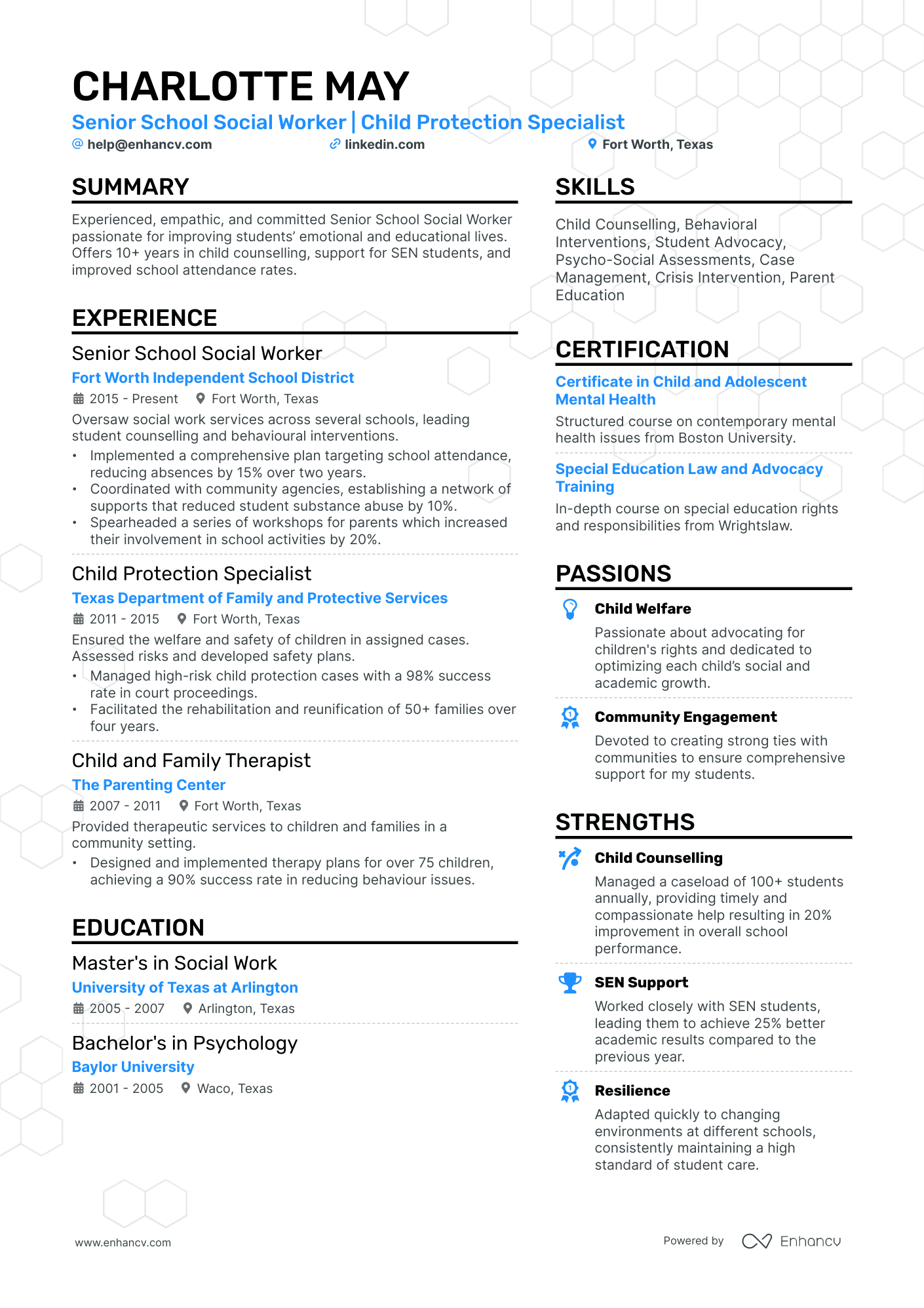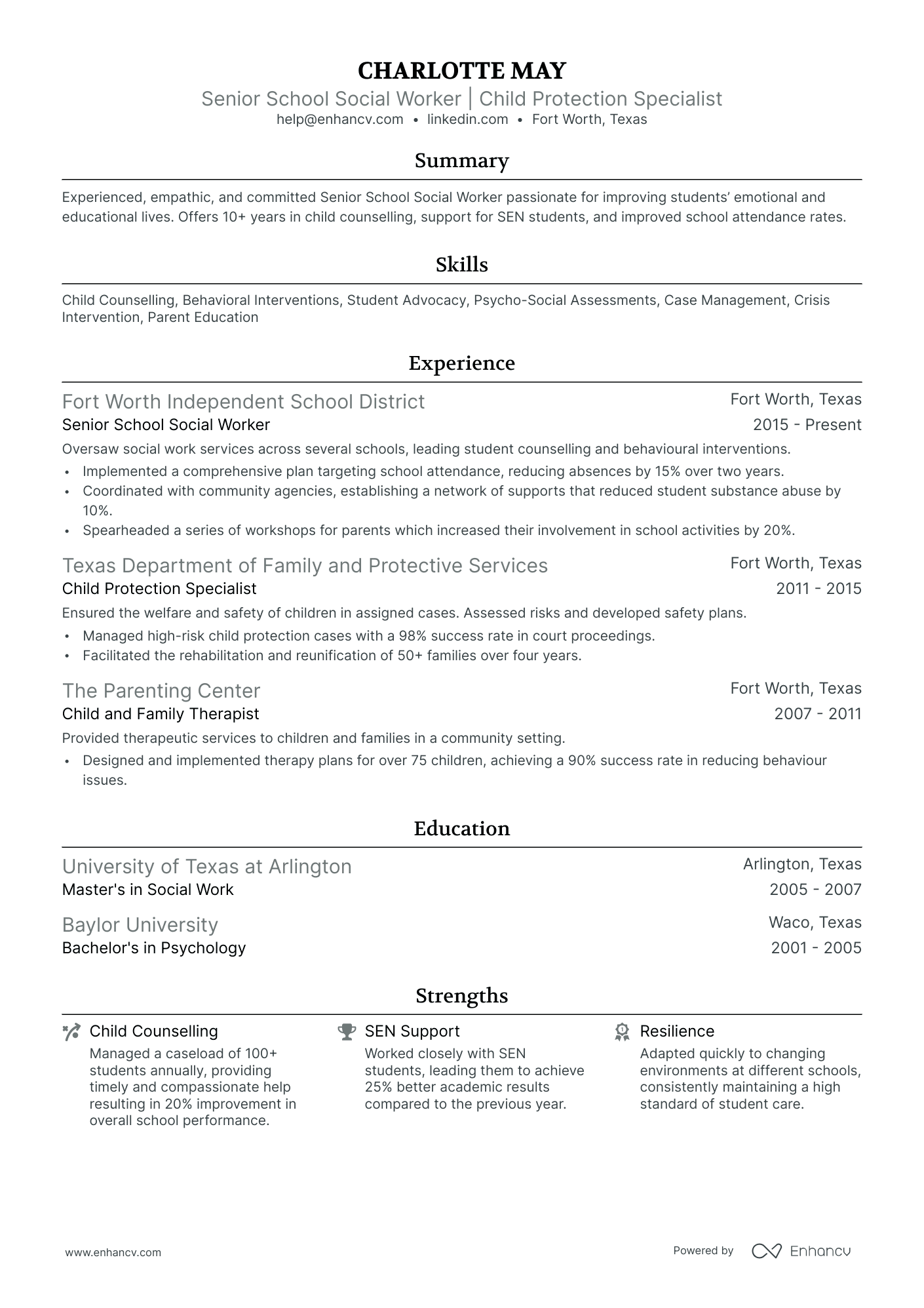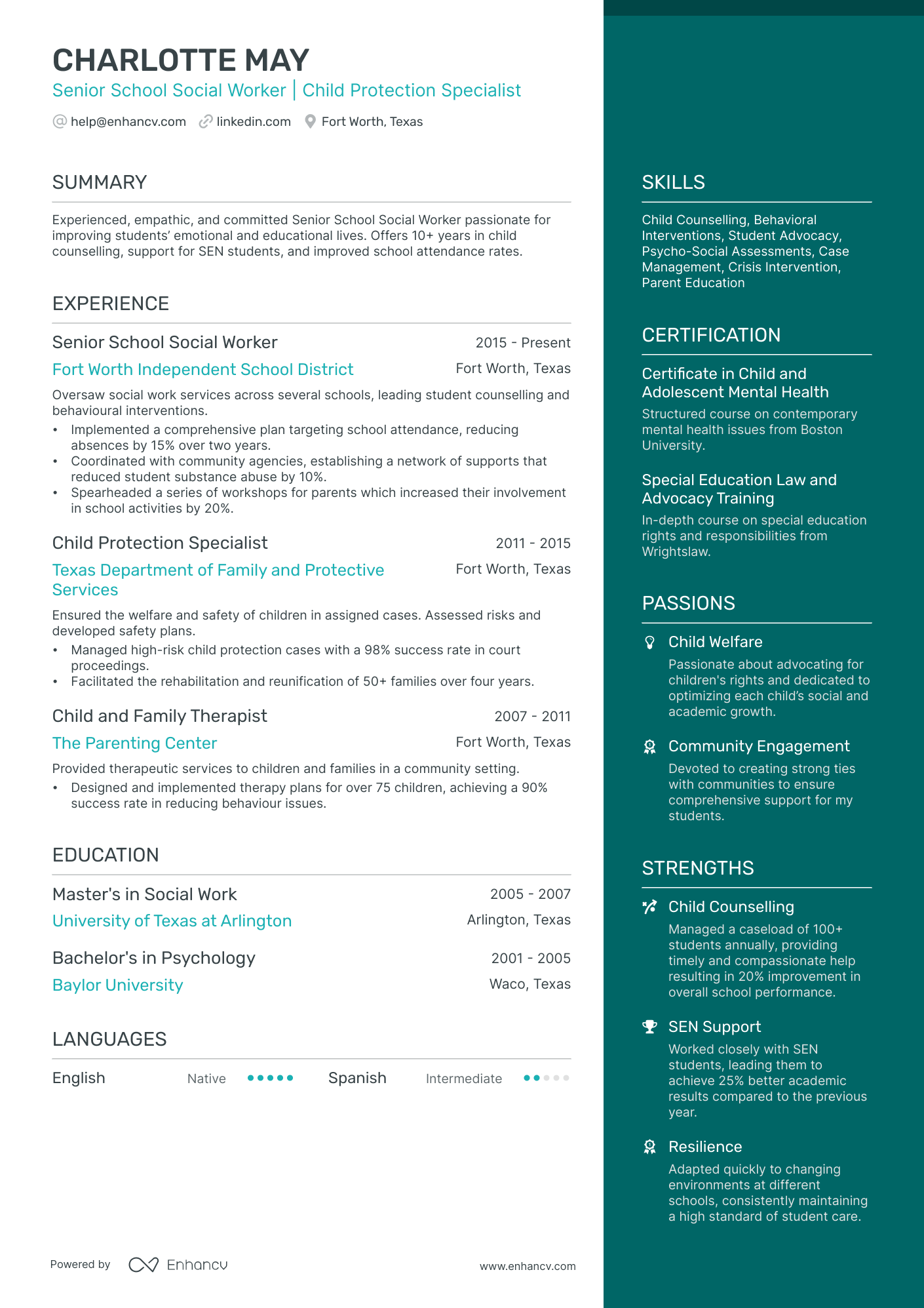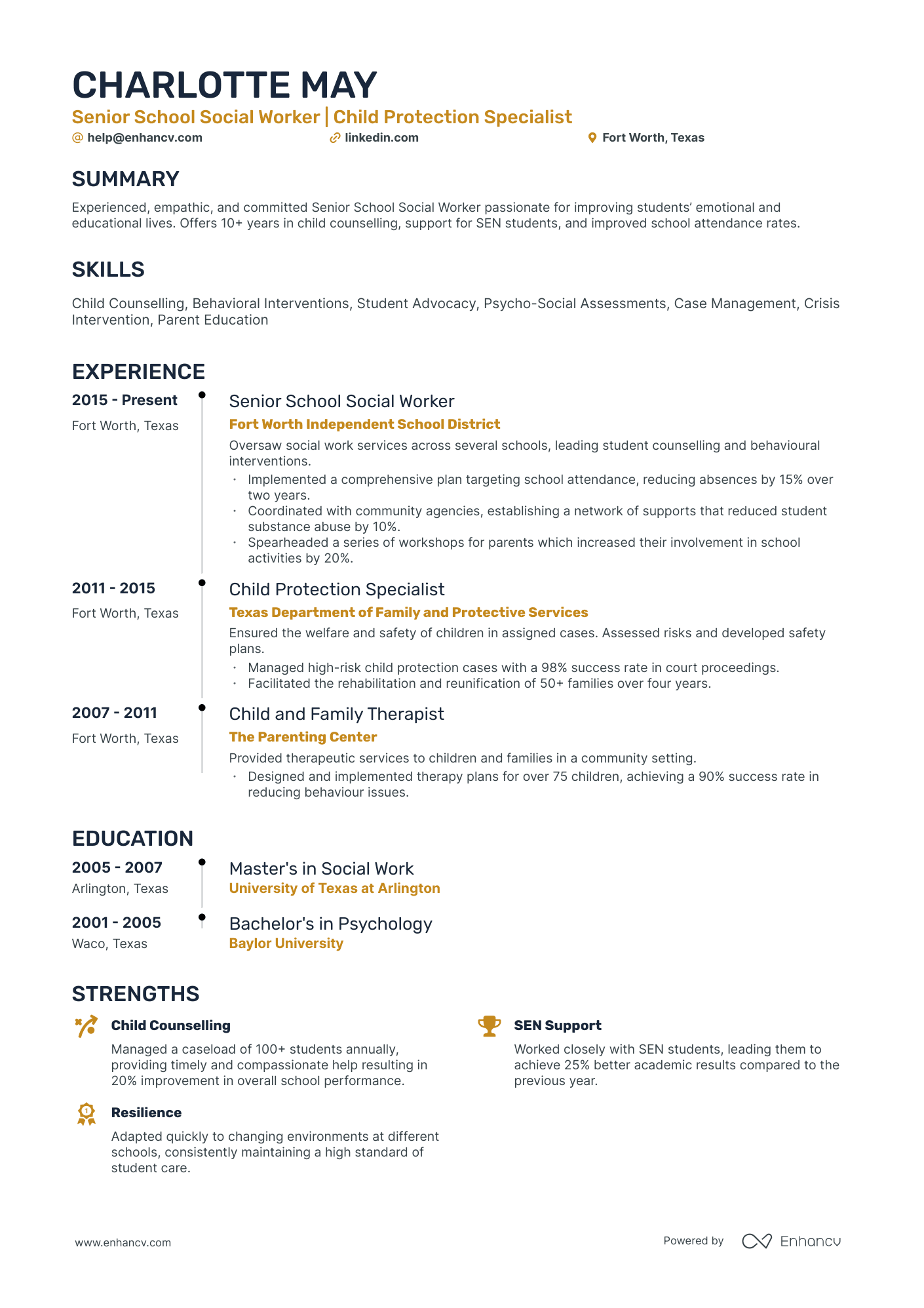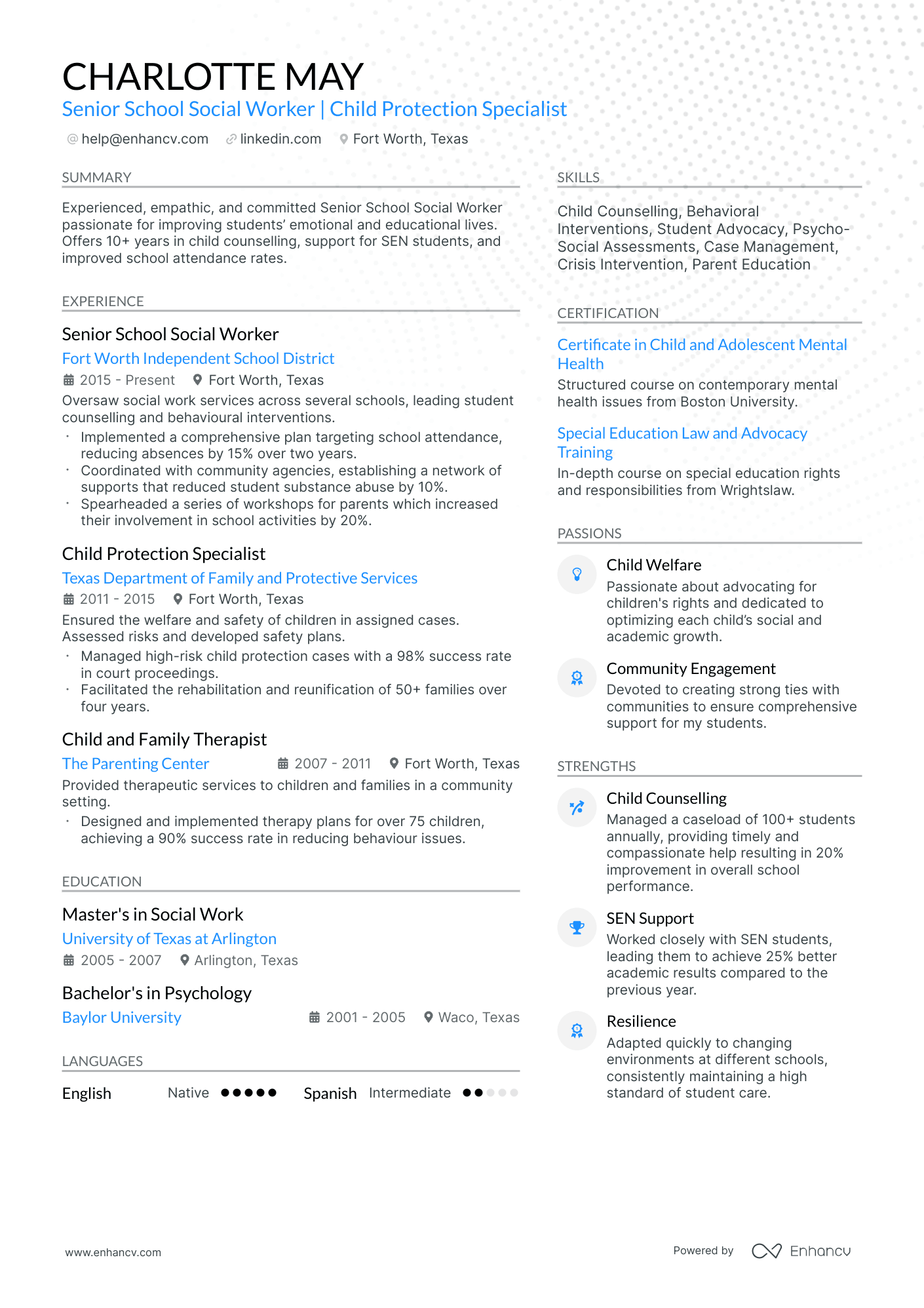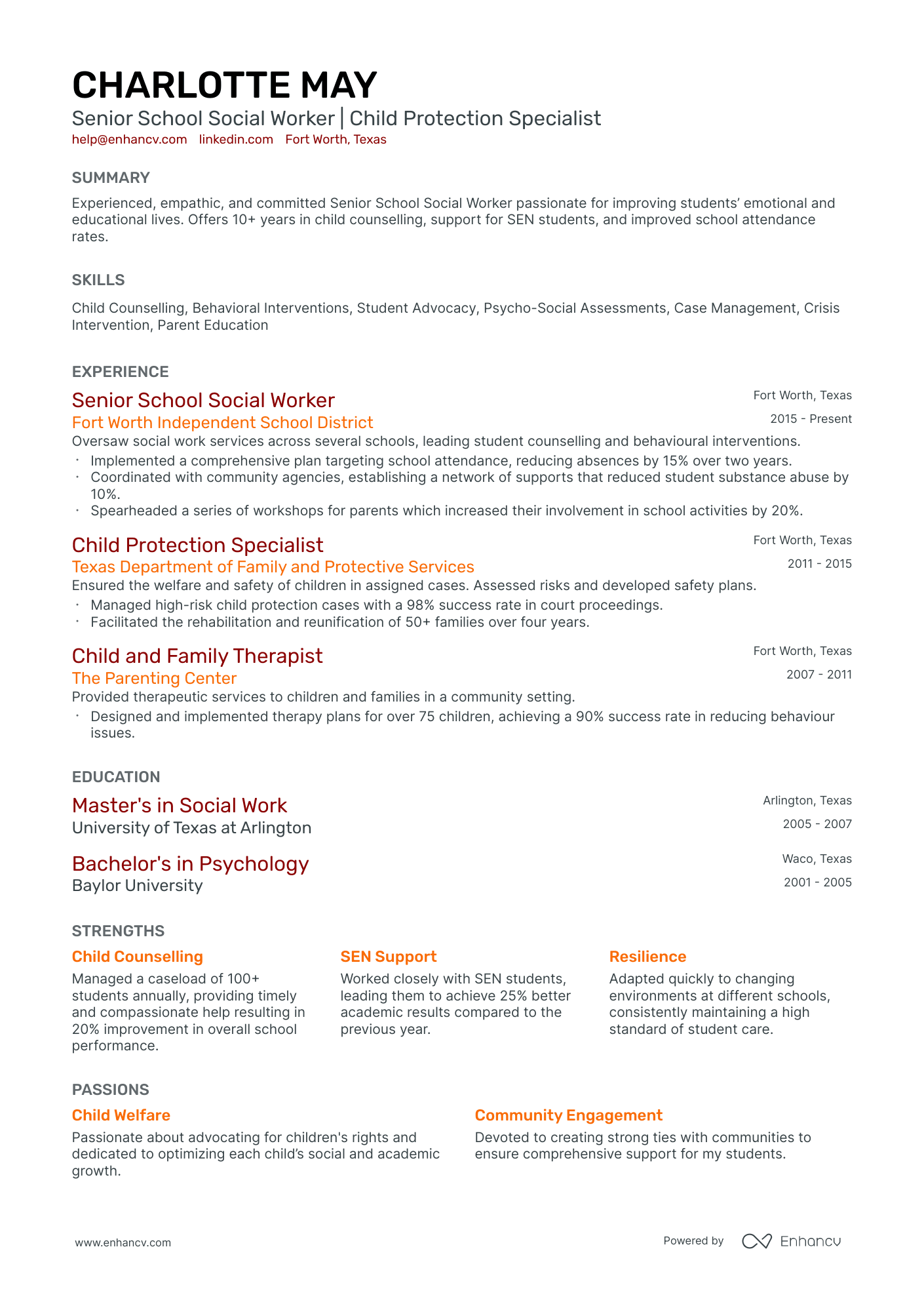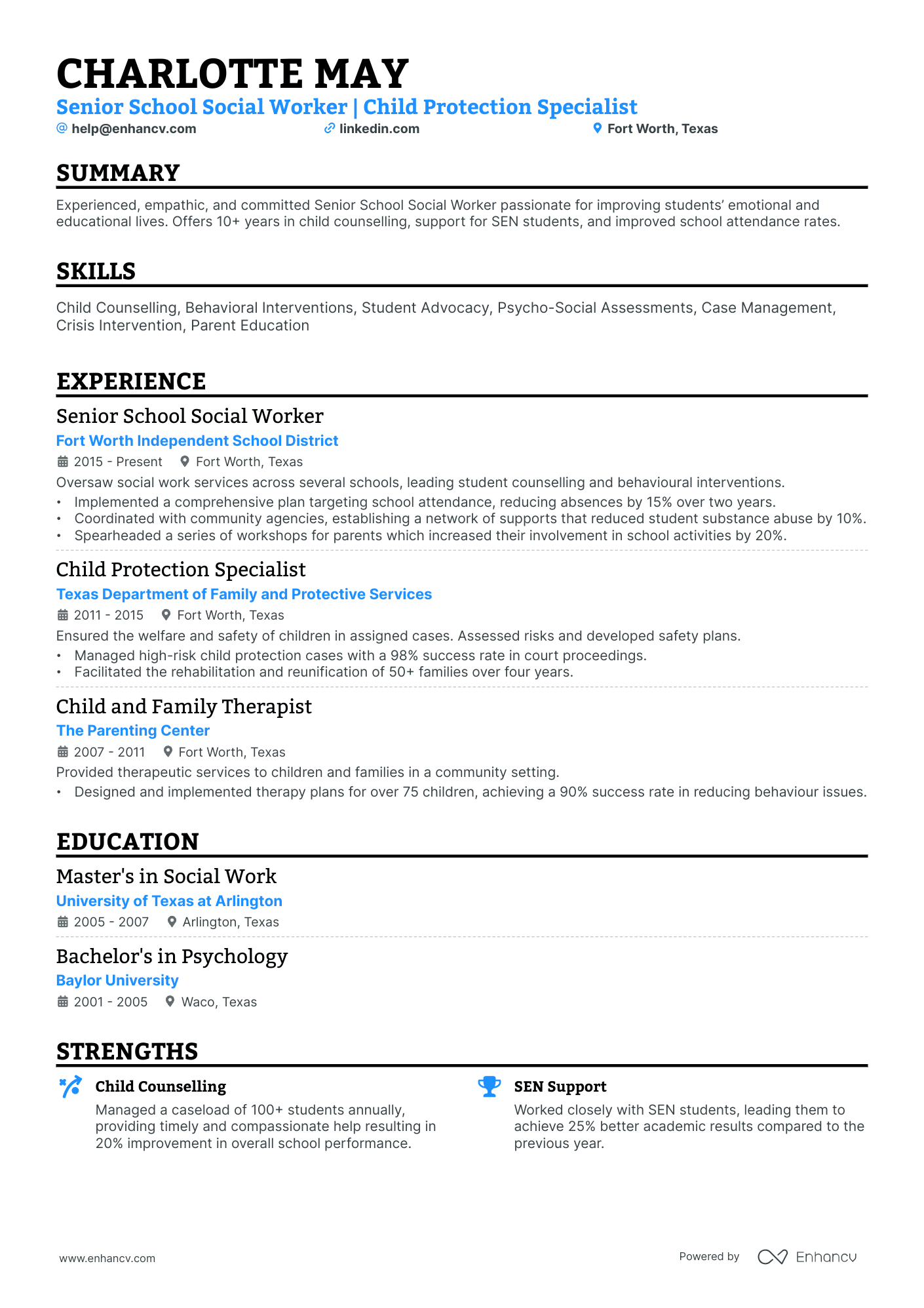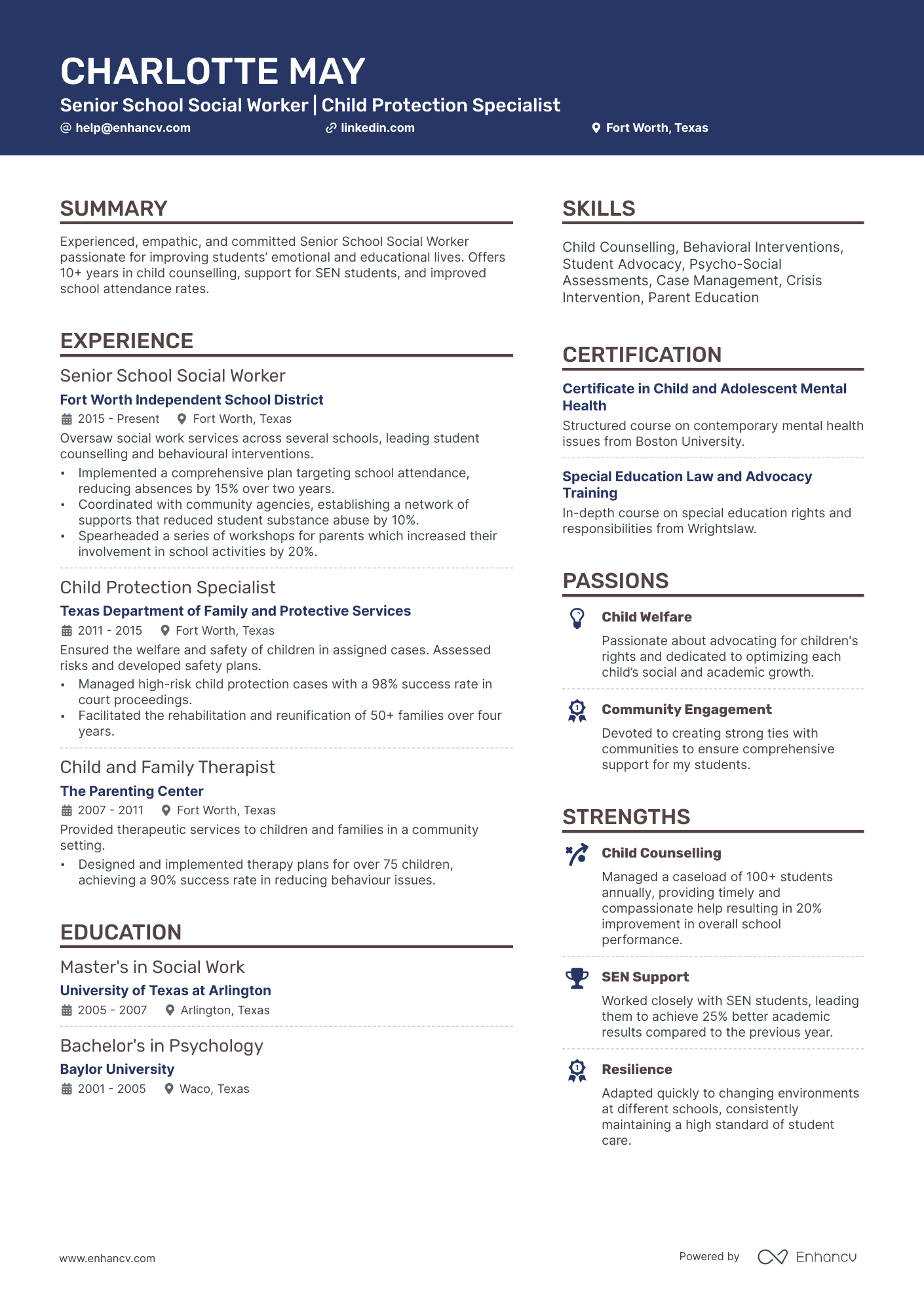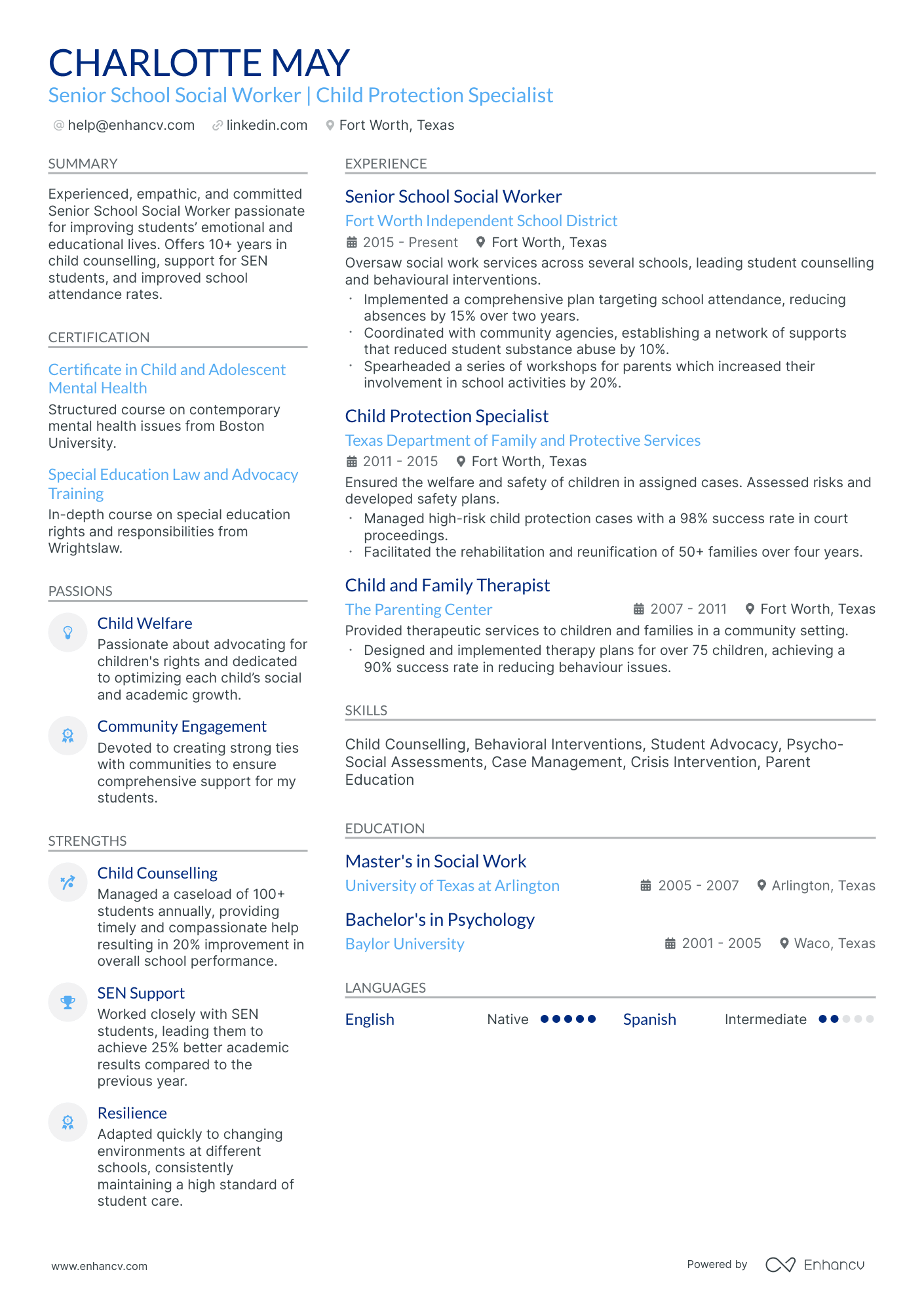One key challenge faced by school social workers when crafting resumes is demonstrating their wide-ranging skills and experiences in an impactful yet succinct manner. Our guide can assist by providing specific writing tips and demonstrating how to effectively use action verbs and metrics to quantify and highlight your unique accomplishments and contributions in the field of school social work.
Dive into this guide to discover how to craft a compelling school social worker resume:
- Explore top-tier school social worker resume samples, spotlighting industry-leading skills and experiences.
- Uncover over ten tailored strategies to make your school social worker resume resonate with the job description.
- Illuminate your unique value as a school social worker candidate, using your professional achievements as a guide.
- Debunk the myth that education doesn't matter, and learn how to leverage your academic and certification credentials effectively.
Recommended reads:
Designing your school social worker resume: best practices
Before penning down your school social worker resume, consider its structure and format. Here's what you should remember:
- Employ the reverse-chronological format to present your experience, starting with your most recent role.
- Your resume's header should feature accurate, professional contact details. If you maintain a professional portfolio or LinkedIn profile, include its link.
- Keep your resume concise, ideally within two pages. Prioritize relevance over length.
- Unless directed otherwise, save your resume as a PDF to preserve its design.
Upload your resume
Drop your resume here or choose a file. PDF & DOCX only. Max 2MB file size.
Pro tip
While color can enhance your school social worker resume by emphasizing key details like headlines, job titles, and degrees, moderation is key. Stick to a primary and a secondary color to maintain professionalism and avoid a cluttered appearance.
Essential school social worker resume sections for a comprehensive overview:
- Header: Enables recruiters to swiftly access your contact details and peruse your latest work portfolio.
- Summary or Objective: Offers a snapshot of your career milestones and aspirations.
- Experience: Demonstrates alignment with job prerequisites and highlights your tangible contributions.
- Skills: Captures the full spectrum of your expertise, making you a compelling school social worker candidate.
- Education & Certifications: Bridges potential experience gaps and underscores your dedication to the field.
What recruiters want to see on your resume:
- Certifications and Education: This includes a degree in Social Work (BSW, MSW) and appropriate licensure (e.g., LCSW).
- Experience in School Setting: Having prior experience working as a social worker in a school environment or dealing with children and adolescents is highly valued.
- Knowledge of Child Development and Psychology: Understanding the social, emotional, and cognitive aspects of child development is crucial for this role.
- Familiarity with Educational Laws and Policies: Knowledge about laws related to child welfare, special education, and confidentiality (like FERPA and IDEA) is important.
- Interpersonal and Communication Skills: Ability to communicate effectively with students, parents, teachers, and other staff members.
Recommended reads:
Detailing your relevant experience on your school social worker resume
Showcase your credibility in the resume experience section. For an effective school social worker resume:
- Highlight measurable achievements.
- Scan the job advert for keywords and integrate them throughout your experience section.
- Emphasize your technical proficiencies and how you've applied them in various roles.
- Keep it simple: mention your responsibility, relevant skills, and the outcomes.
- Use this section to convey your unique value, soft skills, feedback received, and the type of company culture you thrive in.
Top professionals ensure their experience section offers a captivating look at their expertise. Check out our sample school social worker resumes for guidance.
- Provided individual counseling to students facing emotional challenges, resulting in a 30% improvement in self-reported well-being.
- Collaborated with teachers and parents to develop personalized intervention plans for students with behavioral issues, leading to a 20% reduction in disciplinary incidents.
- Organized and facilitated group therapy sessions on topics such as bullying prevention and anger management, serving an average of 15 students per session.
- Conducted home visits to assess the social and emotional environment of students, resulting in improved family engagement and a 15% increase in parental involvement.
- Collaborated with community organizations to provide resources and support to students from low-income families, enabling 80% of eligible students to receive free or reduced-price meals.
- Implemented a school-wide anti-bullying campaign, including awareness workshops and conflict resolution programs, decreasing reported incidents by 25%.
- Developed and implemented a comprehensive mental health curriculum for middle school students, equipping them with coping strategies and stress management techniques.
- Collaborated with interdisciplinary teams to identify and address students' academic and social-emotional needs, resulting in a 10% improvement in student attendance and academic performance.
- Provided crisis intervention and counseling services to students and families during emergencies and traumatic incidents, offering immediate support and resources.
- Implemented a school-wide positive behavior support program, leading to a 40% reduction in disciplinary referrals.
- Coordinated with local mental health agencies to facilitate access to therapy services for students with diagnosed mental health conditions, improving overall well-being and academic outcomes.
- Conducted workshops for parents on topics such as effective communication and parenting strategies, resulting in increased parental involvement and support at home.
- Developed and implemented a social-emotional learning curriculum for elementary school students, improving their emotional intelligence and conflict resolution skills.
- Collaborated with school administrators to create and enforce policies addressing cyberbullying, resulting in a 30% reduction in reported incidents.
- Provided consultation and training to teachers on trauma-informed practices, enabling them to better support students who have experienced adverse life events.
- Supported the implementation of Individualized Education Plans (IEPs) for students with special needs, ensuring appropriate accommodations and services were provided.
- Collaborated with outside agencies to secure funding for after-school programs targeting at-risk youth, resulting in increased participation and improved school engagement.
- Facilitated a support group for students dealing with grief and loss, providing a safe space for expression and coping strategies.
- Conducted workshops on conflict resolution and peer mediation for middle school students, resulting in a 20% decrease in physical altercations.
- Collaborated with school counselors and administrators to develop and implement a comprehensive bullying prevention program, fostering a safer and more inclusive school environment.
- Provided crisis intervention services during emergencies and supported students in processing traumatic events, ensuring their emotional well-being.
- Conducted psychoeducational assessments to identify students' academic and emotional strengths and challenges, informing personalized intervention plans.
- Collaborated with teachers to develop and implement classroom-based social-emotional learning activities, promoting positive behavior and emotional regulation.
- Provided counseling and support to students experiencing significant life transitions such as divorce or relocation, facilitating their adjustment and resilience.
- Coordinated with school staff to identify and support students with mental health concerns, connecting them to appropriate external resources and services.
- Collaborated with community organizations to develop and implement a mentorship program, providing guidance and support to at-risk students, resulting in improved academic performance.
- Conducted workshops on emotional intelligence and self-care for teachers, promoting their well-being and enhancing their ability to support students.
- Provided crisis intervention services to students in acute distress, working collaboratively with school administrators and mental health professionals to ensure their safety and well-being.
- Collaborated with the school's special education team to develop accommodations and modifications for students with diverse learning needs, supporting their academic success.
- Implemented a peer mentoring program, pairing older students with younger ones to promote positive social interactions and improve overall school climate.
The following content includes information from "O*NET OnLine" by the U.S. Department of Labor, Employment and Training Administration (USDOL/ETA). Used under the CC BY 4.0 license. The data represents the top responsibilities present on the task lists for school social worker professionals.
Top Responsibilities for School Social Worker:
- Maintain case history records and prepare reports.
- Interview clients individually, in families, or in groups, assessing their situations, capabilities, and problems to determine what services are required to meet their needs.
- Serve as liaisons between students, homes, schools, family services, child guidance clinics, courts, protective services, doctors, and other contacts to help children who face problems, such as disabilities, abuse, or poverty.
- Develop and review service plans in consultation with clients and perform follow-ups assessing the quantity and quality of services provided.
- Address legal issues, such as child abuse and discipline, assisting with hearings and providing testimony to inform custody arrangements.
- Counsel parents with child rearing problems, interviewing the child and family to determine whether further action is required.
- Consult with parents, teachers, and other school personnel to determine causes of problems, such as truancy and misbehavior, and to implement solutions.
- Arrange for medical, psychiatric, and other tests that may disclose causes of difficulties and indicate remedial measures.
- Refer clients to community resources for services, such as job placement, debt counseling, legal aid, housing, medical treatment, or financial assistance, and provide concrete information, such as where to go and how to apply.
- Counsel individuals, groups, families, or communities regarding issues including mental health, poverty, unemployment, substance abuse, physical abuse, rehabilitation, social adjustment, child care, or medical care.
Quantifying impact on your resume
<ul>
No experience, no problem: writing your school social worker resume
You're set on the school social worker role of your dreams. Yet, you have little to no work experience . Here's how you can curate your resume to substitute your lack of experience:
- Don't list every single role you've had so far, but focus on the ones that align with the job you're applying for
- Include any valid experience in the field - whether it's a university research project, or a summer internship
- Highlight the soft skills you're bringing along - those that will have an added value to your application.
- Focus on your education and certifications, especially if they make sense for the role.
Recommended reads:
Pro tip
Boost your resume by focusing on the practical aspects of each job requirement. While it's good to have job-related keywords on your resume, ensure they're backed by action verbs and quantifiable data. This gives recruiters a clear picture of your school social worker professional journey.
How to create an impactful school social worker resume skills section
Recruiters always care about the skill set you'd bring about to the school social worker role. That's why it's a good idea to cherry pick yours wisely, integrating both hard (or technical) and soft skills.
Hard skills are gained through studying, are certifiable, and it's impossible to do your job without them. All in all, they show your suitability for the technical aspect of the role.
Your soft skills are those personality traits you've gained over time and most often than not - outside of the workplace. Soft skills are more difficult to quantify but are definitely worth it - as they show how you'll fit and adapt into a new team environment.
How do you build the skills section of your resume?
- Include up to five or six skills in the section as keywords to align with the advert.
- Create a specific technical skills section to highlight your hard skills aptitude.
- Read more about the culture of the company you're applying and cherry pick the soft skills you have that deserve a mention.
- Make sure you answer the majority of the job requirements that are in the advert within your skills section.
A school social worker's resume requires a specific skill set that balances both industry-specific hard skills with personal, soft skills. Discover the most often used ones on school social worker resumes from our list:
Top skills for your school social worker resume:
Case Management Software
Data Analysis Tools
Electronic Health Records (EHR)
Crisis Intervention Techniques
Behavioral Assessment Tools
Counseling Techniques
Social Work Practice Models
Conflict Resolution Strategies
Mental Health Assessment Tools
Cultural Competency Training
Empathy
Communication
Problem-Solving
Active Listening
Collaboration
Adaptability
Critical Thinking
Emotional Intelligence
Time Management
Conflict Resolution
Next, you will find information on the top technologies for school social worker professonals from "O*NET OnLine" by the U.S. Department of Labor, Employment and Training Administration (USDOL/ETA). Used under the CC BY 4.0 license.
Top technologies for School Social Worker’s resume:
- Microsoft Access
- Student information systems SIS software
- EasyCBM
- Microsoft Excel
Pro tip
When detailing your skills, align them with the job's requirements. Emphasize unique technical proficiencies and provide examples of your soft skills in action.
Highlighting school social worker-specific certifications and education
Your resume education section can be a treasure trove of skills and experiences relevant to the role. Here are the best practices when it comes to featuring it on your resume:
- Highlight advanced qualifications, detailing the institution and duration.
- If you're currently pursuing a degree, mention your expected graduation date.
- Consider omitting unrelated degrees.
- If your academic journey boasts significant achievements, especially in research, elaborate on them.
What's more, shocasing relevant industry certifications can bolster your credibility, even if you lack extensive work experience.
To effectively present your certifications:
- Place pivotal industry certifications prominently in a dedicated section.
- If a certification is particularly impressive, consider featuring it near your name or within the header, summary, or objective.
- Provide details, where relevant, to underscore alignment with the role.
- Recent certifications should be given advantage, as they show your up-to-date knowledge.
Both education and certification sections highlight your commitment to professional growth, a trait valued by employers. Below, explore some of the most current and sought-after school social worker certifications to enhance your application:
Best certifications to list on your resume
- Certified School Social Work Specialist (C-SSWS) - National Association of Social Workers
- Licensed school social worker (LCSW) - School Social Work Association of America
- Licensed Clinical Social Worker (LCSW) - Association of Social Work Boards
- National Certified Counselor (NCC) - National Board for Certified Counselors
- Trauma-Focused Cognitive Behavioral Therapy Certification (TF-CBT) - Trauma-Focused Cognitive Behavioral Therapy National Therapist Certification Program
- National Board Certification School Counseling (NBCCSC) - National Board for Professional Teaching Standards
Pro tip
Remember, certifications can be woven into various resume sections, like experience or summary. Detail how a particular certification enhanced your performance or opened new opportunities.
Recommended reads:
Choosing the right school social worker resume summary or objective
The top section of your resume is pivotal. It should encapsulate your alignment with the job, your unique skill set, and your professional expertise.
Both the resume summary and resume objective can serve this purpose:
- Use the resume objective to spotlight your current achievements and future aspirations. Highlight how you envision your growth in the prospective role.
- Opt for the resume summary to succinctly present your most relevant professional highlights. Aim for brevity, ideally within five sentences.
Ultimately, these sections offer a glimpse into your professional persona and the unique value you bring.
Resume summary and objective examples for a school social worker resume
With 7 years of experience as a Licensed Clinical Social Worker, I have developed strong skills in individual and group counseling to support students' well-being. My expertise in developing and implementing tailored intervention plans has resulted in a 25% increase in overall student performance at XYZ school.
In my tenure as a Senior Counselor for ABC organization, I employed advanced therapeutic techniques that greatly improved the mental health of over 50 children under my care. As I transition into a school social worker role, my adeptness in crisis intervention and behavioral management will ensure a nurturing and safe environment for students.
I bring with me vast professional experience from the healthcare sector where I worked as a Child Psychologist for 10 years. I am well-versed in addressing emotional, social, and academic concerns. Applying these skills as a school social worker, I can effectively manage caseloads, create coping strategies, and foster positive mental health.
As an accomplished Community Advocate with a background in law, I am accustomed to working with diverse populations and handling complex cases. Transitioning to a school social worker role, my critical understanding of family dynamics and child protection laws will aid in safeguarding the interests of students and families.
My objective is to utilize my Master's degree in Social Work and internships involving children welfare in schools to provide comprehensive support to students. I aim to apply my superior communication skills and knowledge in counseling to promote positivity and resilience among students in a rewarding school setting.
Pursuing a career as a school social worker, I am eager to put my recently acquired Bachelor's degree in Psychology into practice. I aspire to use my strong interpersonal skills and foundational understanding of child psychology to contribute to a supportive and encouraging academic atmosphere.
Optimize your resume summary and objective for ATS
Drop your resume here or choose a file.
PDF & DOCX only. Max 2MB file size.
How to include other relevant sections for your school social worker resume
Apart from the standard sections listed in this guide, you have the opportunity to get creative when building your profile.
Select additional resume sections that you deem align with the role, the department, or the company culture.
Here are the ones we recommend:
- Language skills - use a profficiency framework to indicate your aptitude level;
- Hobbies and interests - you can share more about your favorite books or how you spend your time. It's great for culture alignment;
- Volunteering - helps you highlight the causes you care about and hints at people skills you gained such as teamwork, emotional intelligence, and organizational skills;
- Awards - the space for your most prominent school social worker professional accolades and achievements.
Make sure that these sections don't take too much away from your experience, but instead build up your school social worker professional profile. You can add them as a second column to your resume, or on a second page.
Key takeaways
- Craft a school social worker resume that's easy to read and aligns with the role's requirements.
- The top third of your resume should clearly convey your unique value proposition for the school social worker role.
- Tailor your resume to the job, highlighting skills, achievements, and the tangible results of your efforts.
- Detail your certifications and technical skills to demonstrate proficiency with specific tools and technologies.
- The sections you choose should collectively present a comprehensive view of your professional expertise and personality.
